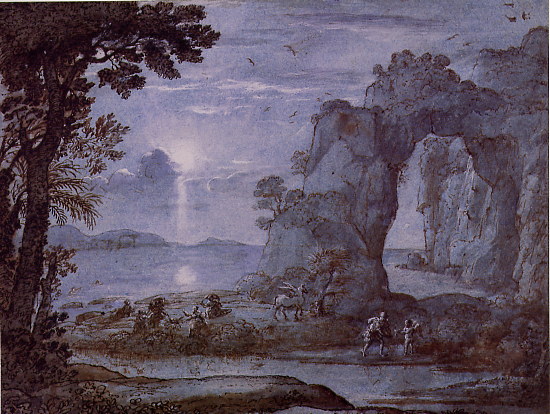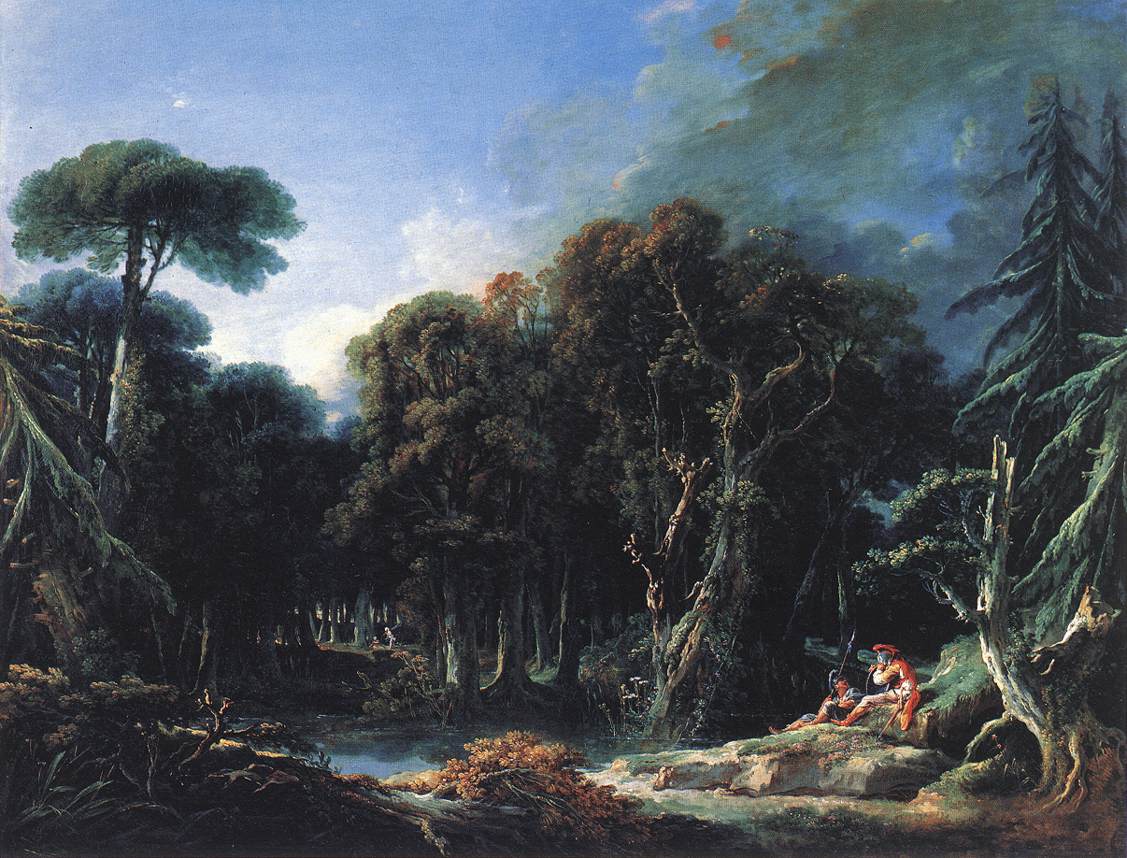

To ECW
Date: Sun, 14 Mar 2004
Subject: [EighteenthCenturyWorlds] Home Page: The Forest by Francois Boucher
(see below)
Reply-To: EighteenthCenturyWorlds@yahoogroups.com
This week's reading of The Romance in the Forest finds Adeline still with the La Lucs at their estate. There are a couple of scenes that could fit the painting on our current home page: http://groups.yahoo.com/group/EighteenthCenturyWorlds/
Dagny
Date: Sun, 14 Mar 2004
Subject: [EighteenthCenturyWorlds] Romance of the Forest, Chs 17-18: Dream
Logic
Reply-To: EighteenthCenturyWorlds@yahoogroups.com
I've got to say what a beautiful and breathtaking picture - perfect as an illustration to the mood of The Romance of the Forest.
IWhen Adeline meets the La Lucs and is adopted by them, later to discover a link with them through Theodore, I knew it reminded me of something. I've just realised that it was the passage in Jane Eyre where Jane is taken in by St John and his sisters - come to think of it, the same sort of thing also happens in Oliver Twist, with Oliver being taken in by Mr Brown, who turns out to be related to him.
Does anybody know how far back in literature this idea of being adopted/taken in by strangers, who turn out to be relations or otherwise linked to you, goes? It seems to be an idea which has a sort of dream logic to it, going with all the dream sequences in The Romance of the Forest.
All the best,
Judy
IDate: Sun, 14 Mar 2004
Subject: [EighteenthCenturyWorlds] Romance of the Forest: Milton and
Shakespeare
Reply-To: EighteenthCenturyWorlds@yahoogroups.com
I was interested this week to see continued what began earlier, what might be called the honourary Englishness of La Luc and Adeline. La Luc is a Protestant clergyman in a Protestant village where neither has any business being (if this were a realistic novel, which it isn't). He speaks English, he reads English, he passes on to the heroine the best of English literary culture--Shakespeare and Milton--the same writers Radcliffe turns to repeatedly and invokes as representatives of the highest cultural, ethical, and aesthetic possibilities. At the end of chapter 17 he talks with M. Amand about the characters of the French and English, attributing to the English wisdom (but a tendency to melancholy) and to the French frivolity, shallowness, sophistical reasoning, a lightness of mind that is easily corrupted (of course, La Motte and the Marquis are exemplars of this type). Radcliffe associates both La Luc and Adeline with the best of what it means to be English, and dissassociates them from the worst of what it means to be French.
Leslie
To ECW
March 14, 2004
Re: Romance of the Forest, Chs 17-18: Literary Landscape Interlude
Thank you Dagny. As Judy says, what a perfect picture for this week's chapters. Like Leslie -- and I suppose all who are reading Radcliffe's RofF with us on schedule -- I noticed the plays upon English versus French culture, types, and literature. (There was an interesting remark showing that she paid real attention to the distinct nature of the two languages too: "The genius of the language [English], more than the genius of the people [by which she means an inner spirit], if indeed the distinction may be allowed [a people and their knowledge is intertwined with the words they use to shape reality], occasioned this [greater melancholy, higher style, graver thoughts].)
However, this was simply really part of a large curve in this week's two chapters which explores landscape through literary perspectives. I know that Chard's notes can be irritating and get in the way: she is often superfluously informative and yet when you want to know the author of a line she can offer only a note which says "unidentified." Nonetheless I found them fascinating this week. Much that we are reading comes through Radcliffe's reading. She never travelled to the places she's describing, but much like many another author of this and other periods, she uses travel books and her imagination. (Richardon's Grandison includes a crossing of the Alps [Mount Cenis] which has astonished people for its accuracy as he never left England.) More it comes to her through Rousseau. Large swatches of what we read here are transposition, responses to, meditations out of Eloisa or La Nouvelle Heloise (Radcliffe could read French fluently), a French memoir-travel book by a lady very like Radcliffe and the woman who translated Radcliffe's Udolpho in class and type. In this section Radcliffe is asserting that nature is not only dangerous but beauty and goodness come from passion when passion is shaped and controlled. Uncannily at times the language looks forward to Proust (we even get remembrance of things past as a phrase; dwelling on the smallest things at length; M. Verneuil's name reminds me of a M. Verneuil the young boy Proust meets in his walks with his parents. This is a landscape of the mind, as Radcliffe moves from travel books to philosophy: "It seems as if we were walking over the ruins of the world, and were the only persons who had survived the wreck." What a suggestive phrase. The prose here is much better than the verse :).
Other books are of course Burke's on the sublime and picturesque; Hester Thrale's travel book (a perpetual source for women); Gray's and Alison's letters; Gilpin's landscape books; Smollett's irascible travel book. Everything that she can wring for the slightest detail to work up into this vision. I also thought of Wordsworth; Radcliffe is trying to express the point of view we find in Wordsworth about simple unadorned ravaged nature (she too has a thorn and bleak landscape to get through at moments), about the deprived too (in the detail she took from Smollett), but she lacks the originality to invent a new language for these things so they don't stand out in her text as original. What distinguishes Wordsworth from the other poets of the later 18th century is his insistence of "the language of men as it's really spoken;" he breaks away from poetic language. She doesn't; her use of plain colours reminds me of Pope in his pastoral: she simply uses nouns like blue and yellow, and it's effective.
Judy asks where the long-lost family comes from, or how far it goes back. As far as I've read to Greek romance, and probably much farther back than that. Consider Oedipus. Paul and Virginia are not brother and sister but they might as well be and they are modelled on Longus's Daphnis and Chloe. Shakespeare's late romances delve this material through their basis in Elizabethan rewrites of Greek romances. The dream logic is central to Freudian analysis of the traumatic family romance. I was struck at how La Luc is a widower: Madame is his sister; this is just what we find in Udolpho; in The Italian the heroine lives with a kindly aunt. Aggressive sexuality is denied the father figures around the Radcliffe heroine; only when this aggression is redirected through twisted violence can the father figure be intensely sexual (Pierre de La Motte, Schedoni).
M. Armand is a kind of Colonel Brandon and his melancholy reawakening of painful memory is like Brandon's of his cousin and lover, Elizabeth Brandon, when he looks at Marianne Dashwood. La Luc is Radcliffe's "answer" to Goldsmith's Vicar and Prevost's Doyen of Killerine (I misspelt that).
I very much enjoyed this week's chapters though I know they constitute a kind of utter abandonment of the novel form and this particular novel's suspenseful plot-design for a time. I wish Radcliffe not only had more original language for her verse and had had an editor to chop excess. I wish she had more abilities with language to present the inward rebound into intense relief and release these chapters register. At their center is a grave, that of La Luc's wife and grief overcome or sustained in M. Armand, La Luc, M. Verneuil. I do note that except for her heroine, Radcliffe does not endow her women characters with the same gravitas and seriousness as she does her men. Madame de La Luc is laughed at; Clara is a child.
Cheers to all,
Ellen
To ECW
March 15, 2004
Re: Romance of the Forest, Chs 17-18: Artificial Literary Landscape Interlude
I forgot to mention another text by Rousseau which is alluded to and elaborated upon in this week's chapters: Chard quotes Rousseau's Reveries of a Solitary Walker as a central text for a number of the passages.
I bring this up because I am hoping that when we finish Scott we'll go on to Wollstonecraft's A Short Residence and Rousseau's Reveries of a Solitary Walker. Neither is very long and both brilliantly poetic and true to life in the 18th century in the best sense of these terms.
Ellen
